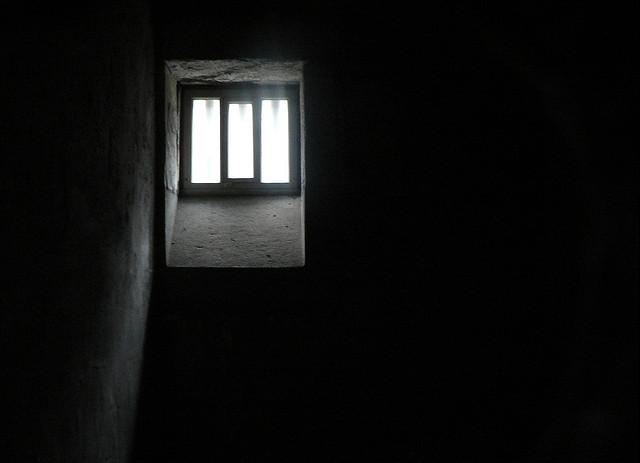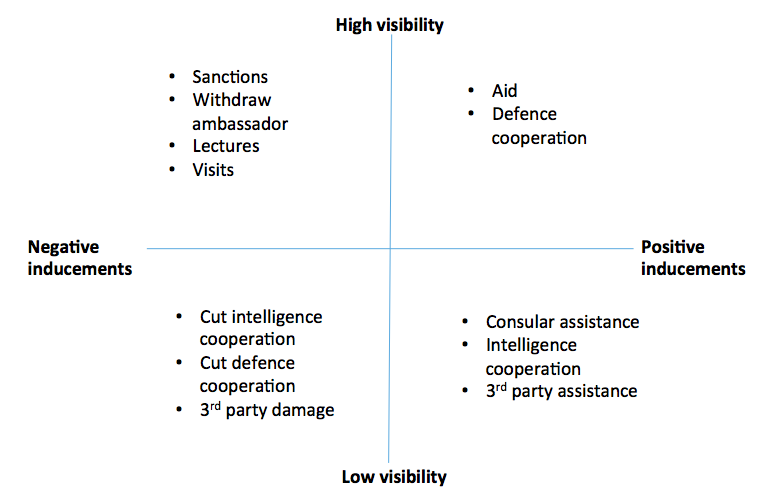
Put aside for one moment your emotion over the looming execution of Andrew Chan and Myuran Sukumaran. Anger and appeals to decency won’t save them. The only thing that might work is to think through the reality of negotiation between two parties with different needs. Jakarta has something Canberra wants—something we want rather badly because of a deeply-felt opposition to capital punishment. Indonesians, by contrast, want to stamp out the drugs killing their children. They prize the perceived deterrent value of executing convicted drug traffickers.
The temperature of Indonesia–Australia relations over recent years has ranged from mildly warm to downright frosty. With few connections to Australia, Indonesia’s President Widodo feels he owes us no particular favours. Unlike President Yudhoyono who had more liberal views on capital punishment, Jokowi campaigned on a strong anti-drug platform, including using the death penalty. After a fall in popular support he probably sees little value in making a concession to Australia that would force him to back down on an election promise.
Here’s Australia’s dilemma: in a negotiation where one party (Canberra) desperately wants an certain outcome and the other party (Jakarta) has the key decisionmaking power but doesn’t see much value in making concessions, what can the weaker negotiator do to gain its desired outcome? The answer is that Australia needs to consider two factors. First, what positive or negative inducements can we offer to change Jokowi’s calculation of interests. And second, how should we pursue our strategy? Australia can use ‘high-visibility’ techniques, for example by making public statements and gestures, or take a ‘low-visibility’ approach, using back-channel diplomacy.
The table below sets out Australia’s options to secure clemency for Chan and Sukumaran (click to enlarge).

A strategy offering positive inducements to Widodo could offer high-profile and substantial increases in aid or defence cooperation in return for clemency. That’s unlikely to work. Widodo couldn’t be seen to make concessions on his principle of attacking the drug trade, or in publicly buckling to offers of incentives from abroad. Bribes work only when made privately. And Prime Minister Abbott can’t link rewards so openly to preventing what Australians regard as unethical behaviour. For the same reason most countries refuse to pay terrorists to release hostages.
A high-profile strategy involving negative inducements isn’t likely to work either. Australian threats of economic sanctions, or of withdrawing our ambassador and diplomatic staff, or making unfavourable comment about Indonesia in the international media would be deeply counterproductive in Indonesia. Ask how Australia would react if the situation was reversed and we were receiving strong and public negative Indonesian comments about our policies—as happened, for example, in 1999 during the East Timor crisis. Threats of negative Australian actions will only strengthen Indonesian resolve and lead to tit-for-tat responses. Australia has seldom achieved positive results by attacking behaviour we disliked. Our past punitive responses to French and Indian nuclear testing and to coups in Fiji and Thailand hurt us as much as the intended targets and completely failed to alter the behaviour we wanted to change.
What about our options for positive or negative inducements that happen in a ‘low-visibility’ way, without media coverage and using private communications? Negative inducements—for example cutting intelligence and defence cooperation—might be threatened if Indonesia carries out the executions. But while Jakarta privately values this cooperation the benefit doesn’t outweigh the short-term political cost to Widodo of being seen to compromise. And Australia would lose as much as Indonesia by cutting those ties. Neither side wins by ending mutually valuable cooperation.
So we come to Canberra’s last option: offering positive inducements to Jakarta in a non-public way aimed at securing clemency. What is it that Widodo would value enough to make him change his current course of action? Three possibilities come to mind. First we could offer active consular assistance to intercede with, and on behalf of, Indonesia in their diplomatic actions to stop their citizens being subjected to the death penalty around the world. Second, we could offer to deepen intelligence cooperation targeted against the threats that most worry Indonesia, such as returning foreign fighters from the Middle East. Third, we could offer active third-party advocacy to support Indonesian ambitions for greater influence in multilateral forums. Only Widodo could judge if such inducements meet an Indonesian cost–benefit analysis.
All of the above casts the human tragedy of Chan and Sukumaran into a literal version of game theory’s ‘prisoner’s dilemma’, an artefact of strategic and economic thinking used to analyse everything from the nuclear balance to companies competing for market share. The theory argues that—between distrustful parties—the short-term pursuit of individual interest will usually triumph over the longer-term benefits of cooperation. That’s the sad reality for both countries in dealing with the current tragic case. For Widodo almost nothing outweighs his domestic political priorities. In Canberra we could hardly claim to be any better. So the likely outcome is that short-term political calculations will win out over the longer-term benefits of cooperation.
The prisoner’s dilemma should be adopted as the bastard mascot of Australia–Indonesia relations. Almost every unhappy bilateral moment in our links since Indonesia’s independence in the 1950s can be explained in terms of the immediate triumph of short-term interests over a more rational assessment of our shared geographic destiny. There’ll never be solutions to Indonesia’s drug problem, or Australia’s illegal people movement problem, or our shared terrorism problem until both countries find the maturity to overcome the prisoner’s dilemma.
Peter Jennings is executive director of ASPI. Image courtesy of Flickr user Aapo Haapanen.